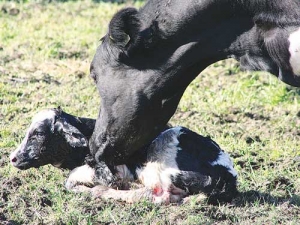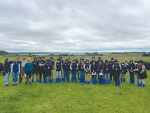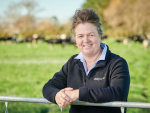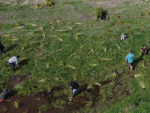About 30% of Australian dairy farmers are missing out on the advantages of a transition cow nutrition management programme, says Dairy Australia.
This technique is among the significant advances in dairy nutrition and production of the past 20 years, says the group’s programme manager for animal health and fertility, Kathryn Davis. It can improve cow health, milk production and reproductive performance.
But a Dairy Australia survey has found only about 70% of farmers are using the system – better than the 65% found in the previous survey – and not all farmers using the programme have an approach that meets all the cow’s nutritional needs.
“It’s improving but there are still 30% missing out on the benefits,” Davis says.
Among farmers using the system there’s “usually some room for improvement. Even some farmers doing it for a while find things they can tweak to make it easier, reduce the labour time or get better results. Some are still working with different nutritional regimes to see what works best for their animals.”
Davis says many benefits accrue from having a transition cow system. “The cow will be well prepared to transition from being dry to coming back into lactation; she’ll produce more milk once she gets into the milking herd and she’s more likely to have low stress calving and keep in good health.
“It keeps her well supported during the challenge of pregnancy and it has benefits for fertility down the track.”
Davis says evidence of the benefits of transition cow management have got stronger over the past 20 years and more farmers are catching on.
“We keep building our knowledge of what’s the best way to do this in our systems,” she says. “We’re still learning how to do it well. The farmers who adopt a good strategy can see the benefits.”
Davis says the system could vary from farm to farm.
“It’s difficult to give generic advice. There are a lot of factors you have to take into consideration when planning a transition strategy: what your goals are, what your cow nutrition and body condition is leading up to calving, and what diet those cows will be expected to perform on once they go into a lactating herd.”
It takes about three weeks on a transition cow diet to get the best value for conditioning the rumen. Restricting pasture and putting cows on rations is a usual strategy.
“There are different ways of tackling it and it depends on what system you have and what sort of diet the cows are expected to be on once they start lactating,” Davis says.
Rations vary and while Dairy Australia runs workshops for farmers to work out the best strategy for their farms “we don’t put out recipes”.
“It’s more about understanding your system and your goals and working with a nutritionist to come up with a diet that’s going to work well. Some have a simple transition diet, others have a more complex one balanced with respect to all the nutrients.”
Davis says speaking to a nutritionist would help farmers. “It’s complicated and we don’t expect all farmers to be experts in this area.”


















